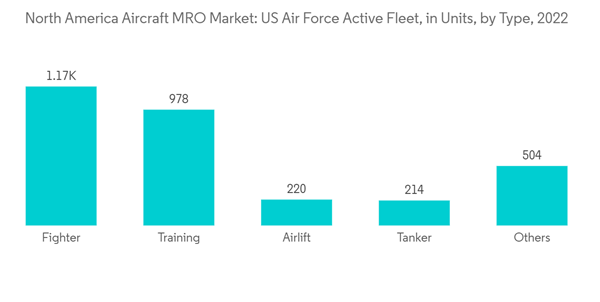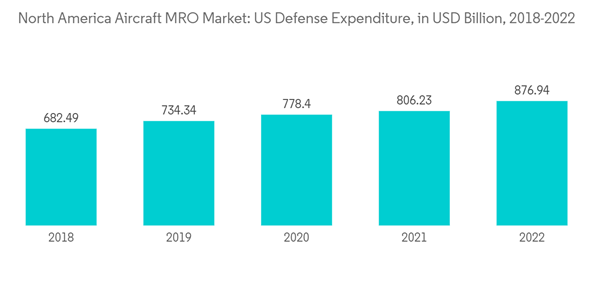North America has the largest fleet of commercial, general, and military aircraft in the world, and they require regular MRO services for operational availability. Several contracts and agreements are underway between aircraft MRO service providers and airlines, defense agencies, etc., due to the induction of new aircraft due to the ongoing/planned fleet expansion initiatives. Moreover, implementing stringent safety standards and introducing new laws by legislative authorities have also encouraged fleet upgrades, triggering demand for aircraft MRO services in the region.
North America, especially the US, is the frontrunner in defense aviation, with several aircraft models being deployed in the fleet and several units of new advanced aircraft being inducted each year. This also generates demand for MRO services as these aircraft are subjected to extreme wear and tear due to operation in harsh terrains for an extended period. The growth of emission regulations for the airspace by various regulatory bodies, like FAA, IATA, and ICAO, will lead to generating greater demand for better engine maintenance for older aircraft, as their emissions are higher compared to the newer generation aircraft engines, which in turn will be a significant factor driving the market during the forecast period. On the other hand, supply chain issues and shortage of skilled workforce and components hinder the market growth.
North America Aircraft MRO Market Trends
Military Aviation Segment is Projected to Significant Growth During the Forecast Period
The military aviation segment will showcase remarkable growth during the forecast period. The growth is attributed to the increasing defense expenditure, rising procurement of next-generation military aircraft, and growing aircraft modernization programs from the US Air Force. The US Air Force’s logistics enterprise is building its first artificial intelligence-driven data system, called the Basing & Logistics Analytics Data Environment (BLADE). BLADE gathers information from more than 300 Air Force and broader Defense Department data sources. The US Air Force has expanded its artificial intelligence (AI)-powered predictive maintenance tools, called Condition-Based Maintenance Plus, to 16 of its aircraft fleets. Furthermore, Canada is also struggling with the aging fleet of its CF-18 fighter aircraft, which has reached the age of more than 33 years. A few aircraft in the Royal Canadian Air Force are too old to be upgraded with the latest equipment to comply with the latest air traffic and aviation rules. Also, In April 2023, GE Aerospace signed an agreement with Lockheed Martin Corporation to support avionics and electrical power systems on the F-35 military aircraft. Under the four-year agreement, the company will provide MRO services for GE Aerospace systems on the F-35 Lightning II aircraft. The company will service the F-35 systems at its repair and maintenance locations in California, Georgia, and Utah. Thus, growing procurement of fighter jets and rising expenditure on military aircraft modernization programs drive the growth of the market during the forecast period.The United States is Estimated to Dominate the Market During the Forecast Period
The US held the highest shares in the market and will continue its domination during the forecast period. The growth is due to the presence of the highest commercial and military aircraft fleet, the largest number of airports, and a large number of MRO service providers. The United States is the leading producer of commercial, defense, and general aviation aircraft. The increase in spending on aircraft development is further propelling the growth of the aircraft and aircraft MRO markets. The major driving factor for the MRO in this country is the significant demand to upgrade such a vast fleet with the latest technologies and systems. The US Department of Defense (DoD) plans to spend USD 61.1 billion on aircraft and related systems in 2024. The DoD plans to buy a diverse mix of 270 aircraft, ranging from nearly USD 700 million B-21 stealth bombers for the USAF to twin-engine King Air 200-derived trainers for the US Navy. The US DoD budget requests for FY2022 and FY2023 depot maintenance reached USD 32.6 and USD 35.1 billion, respectively. According to DoD, the FY2023 budget request would fund 50% of total executable Army depot maintenance requirements, 85% of Air Force requirements, 80% of Marine Corps requirements, 71% of Navy requirements, and 83% of Space Force requirements. The majority of the MRO expenditure is on the nation’s large fleet of multi-role aircraft, transport aircraft, and surveillance aircraft that require high maintenance on engines and airframes, along with field and component maintenance services. Thus, the increase in several aircraft acquisitions and the growing presence of aircraft engine MRO service providers within the United States will lead to a positive outlook and significant market growth during the forecast period.North America Aircraft MRO Industry Overview
The aircraft MRO market in North America is semi-consolidated in nature, with the presence of several players holding significant shares in the market. Some of the prominent players in this market are Lockheed Martin Corporation, General Electric Company, The Boeing Company, Rolls-Royce plc, and RTX Corporation. The region is marked by the presence of several foreign MRO service providers as well. MRO service providers are increasing their focus on IT and technological developments to increase efficiency and reduce the time consumed on MRO activities. The primary revenue generation strategy of market players is to win long-term contracts from the armed forces, airlines, and freight carriers.Strategic alliances among players may help them win more contracts while also expanding their reach into unexplored markets in the long run. Predictive maintenance solutions based on artificial intelligence (AI) are also expected to gain traction throughout the projected period. Potential expenditures would be necessary to improve MRO operators' IT capabilities for maintenance execution, supply chain management, mobility enhancement, and adoption of e-signatures. MROs are increasingly using advanced data analytics for inventory management to plan, stock, and optimize spares as needed at the lowest possible cost. Such tools allow operators to operate more efficiently, profitably, and contribute to the digitalization of North America aircraft MRO operations.
Additional Benefits:
- The market estimate (ME) sheet in Excel format
- 3 months of analyst support
This product will be delivered within 2 business days.
Table of Contents
Companies Mentioned (Partial List)
A selection of companies mentioned in this report includes, but is not limited to:
- ST Engineering
- Delta TechOps (Delta Air Lines Inc.)
- Collins Aerospace (Raytheon Technologies Corporation)
- General Electric Company
- Safran SA
- Rolls Royce PLC
- Honeywell International Inc.
- Lockheed Martin Corporation
- The Boeing Company
- Textron Inc.
- IAG Aero Group
- Lufthansa Technik AG (Lufthansa Group)
- AAR Corp.
- StandardAero
- MTU Aero Engines North America Inc. (MTU Aero Engines)
- GKN Aerospace Services Limited










